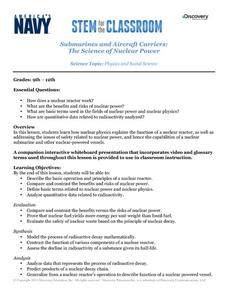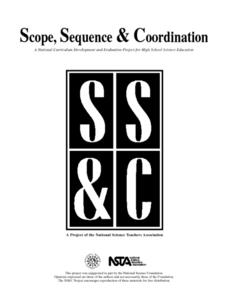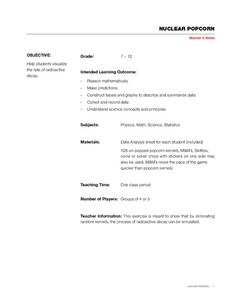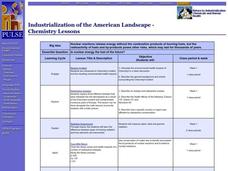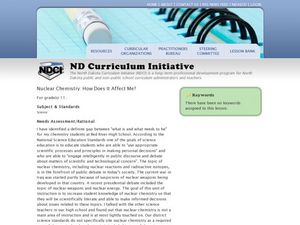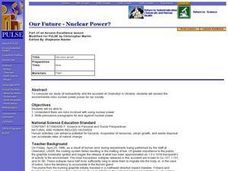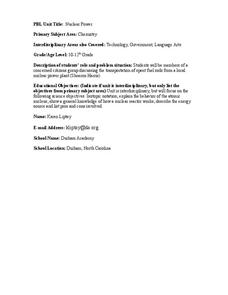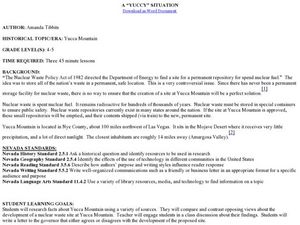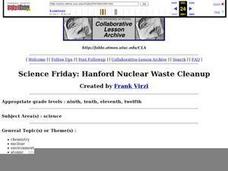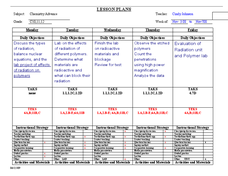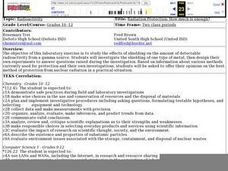Discovery Education
Submarines and Aircraft Carriers: The Science of Nuclear Power
As physics masters view this presentation, they learn how nuclear power is used in submarines. They use Google Maps to plot a course through the ocean and calculate the time required for surfacing and traveling. They learn about fission,...
Curated OER
Radioactive Simulations
Young scholars simulate radioactive decay and nuclear power using an on line interactive web site. In this on line lesson plan, students monitor radioactive isotopes and record the activity of a particular element as the decay...
Curated OER
Radioactivity, Time, and Age
Four activities demonstrate the chain reaction of nuclear fission to your physical science fans: falling dominoes, snapping mouse traps, throwing paper wads, and igniting a series of matches. They perform additional...
National Museum of Nuclear Science & History
Nuclear Popcorn
Make your lesson on radioactive decay pop with this lab exercise. Using popcorn kernels spread over a tabletop, participants pick up all of those that point toward the back of the room, that is, those that represent decayed atoms. As the...
Curated OER
Radioactivity Quiz
For this radioactivity quiz worksheet, students complete a 10 question true/false quiz. Quiz is also available as a student handout and Powerpoint presentation.
Curated OER
Radioactive Decay and Half-Life
Students describe how the mass of a radioactive isotope changes with time and the factors that affect the rate of radioactive decay. They write nuclear decay equations to represent natural transmutation. This activity is accomplished...
Curated OER
Breaking News: Second Explosion at Japan Nuclear Plant (14th March, 2011)
Students explore current events by sharing information about the Japanese nuclear plant. In this nuclear energy activity, students discuss the pros and cons of nuclear energy plants and whether or not they can typically withstand natural...
National Museum of Nuclear Science & History
Alphas, Betas and Gammas Oh, My!
Referring to the periodic table of elements, nuclear physics learners determine the resulting elements of alpha and beta decay. Answers are given in atomic notation, showing the atomic symbol, mass, atomic number, and emission particles....
Curated OER
Industrialization of the American Landscape
Students explore the Chernobyl incident and the resulting environmental health impacts. They explore three different isotopes that were released into the atmosphere. Through inquiry, students determine the difference between types of...
Curated OER
Radioactive Decay: A Sweet Simulation of a Half-life
Students demonstrate rates of decay of unstable nuclei can be measured. They understand ratios and multiplication of fractions. They simulate radioactive decay. They read about the accomplishments of scientists.
Curated OER
Radioactivity Experiments
Learners study the difference between types of ionizing radiation and how elements are transmuted. They determine that radiation is normal and surrounds us. They calculate the amounts of alpha, beta and gamma radiation emitted from a...
Curated OER
Atomic Candy
Mmmmm! Radioactive "candium!" Nuclear physics or chemistry classes use M&M'S® to demonstrate the process of radioactive decay. Individuals pour out a bag of candies and record the number that fall M-side-up to represent the...
Virginia Department of Education
Determining Absolute Age
How can radioactive decay help date old objects? Learners explore half-life and radioactive decay by conducting an experiment using pennies to represent atoms. Young scientists graph data from the experiment to identify radioactive decay...
Curated OER
Radioactive Decay
Students explore radioactive decay. Through various activities, students examine methods for permanent disposal of radioactive waste. After performing a random process experiment, students compare the results to radioactive decay. ...
Curated OER
Nuclear Chemistry: How Does It Affect Me?
Eleventh graders study the different areas of nuclear chemistry. In this energy and critical thinking lesson plan students study radiation, nuclear energy and weapons then divide into groups and create a poster.
Curated OER
Our Future - Nuclear Power?
Students comprehend that there are risks involved with using nuclear power. They write persuasive paragraphs for and against nuclear power. Students analyze the environmental issues and risks with nuclear power.
Texas State Energy Conservation Office
Investigation: Splitting Atoms
In a simple activity, physical scientists model nuclear fission using a droplet of oil. This can be used alone in a unit on different types of energy, or as part of the energy conservation unit produced by the Texas State Energy...
Curated OER
Nuclear Power
Students take on the role of members of a concerned citizens group and discuss the transportation of spent-fuel rods from a local nuclear power plant and the safety issues that surround the power plant. Students work in groups to write...
Curated OER
A Yuccy Situation
Students examine the concept of nuclear waste storage. In this interdisciplinary lesson, students research Yucca Mountain in order to compare and contrast opposing views regarding the nuclear waste site there. Students compose a letter...
Curated OER
Half Lives
Students investigate the concept of half-life by conducting an M&M experiment. In this chemistry lesson, students differentiate nuclear fusion and fission. They present investigation findings to class.
Curated OER
Radioactive Isotopes
Students describe an isotope and radioactive isotope in a written essay. They describe how a specific country or region was affected by radioactive contamination and attempt to sympathize with those affected by these radioactive...
Curated OER
Science Friday: Hanford Nuclear Waste Cleanup
Learners practice careful listening skills to learn about problems regarding cleanup of radioactive wastes at the Hanford nuclear reservation in Washington State. Students answer the questions imbedded in the lesson as they listen to the...
Curated OER
Nuclear Chemistry
Students write and balance nuclear equations. In this chemistry lesson, students identify materials that block radiation using polymers. They collect and analyze data from the experiment.
Curated OER
RADIATION PROTECTION: HOW MUCH IS ENOUGH?
Students study the effects of shielding on the amount of detectable radioactivity from a gamma source. They investigate the shielding of one type of metal, then design their own experiments to answer questions raised during the...
